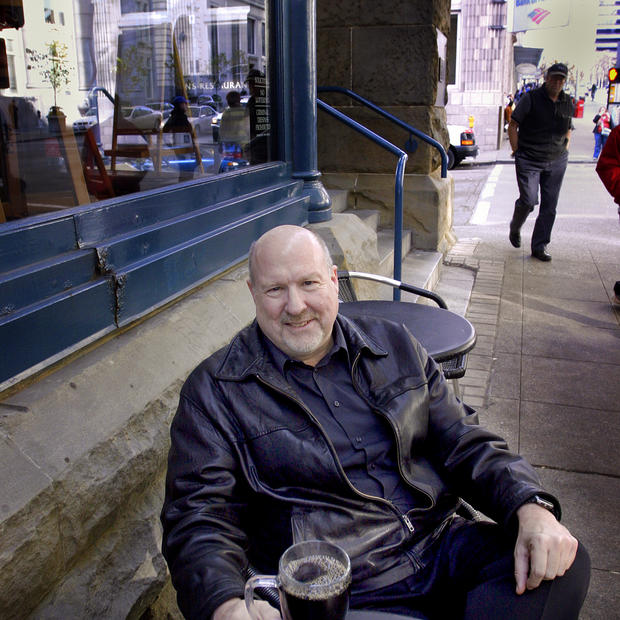In the last six months, a considerable amount of ink has been spilled over the plight of Bertha, our famously busted tunnel borer. Due to an unexpected circumstance, I found myself within a few yards of Bertha several weeks ago, gawking at the hole being scooped out in front of the buried behemoth. A clutch of beefy cranes were, just this morning, tending to Bertha like an oversize pit crew. Looks like it will be at least a year before her teeth are fixed and she's ready to chew.
Five blocks up the hill at Cherry and Fourth Avenue, another big excavation has been stalled for several years. Not a tunnel, but a development site. Six years ago, the Triad Development Company was set to erect a 30-story office building topped with condominiums and a large public space on property owned by the City of Seattle. Then the Recession hit.
Downtown commercial vacancy rates soared, banks stopped financing condo construction and the project was toast. By then, Triad had spent well over $1 million on its plans and a much-valued city permit.
The City has been sympathetic to the circumstances of bad timing. City officials allowed Triad to extend their mutual agreement to build the project until the end of 2015. Of course, that’s not all that far off, given what goes into finding tenants to pre-lease the space and the lengthy process of getting financing. In the meantime, the block-long site sits surrounded by plywood walls, frequently festooned with temporary artwork.
From time to time, the site's James Street gate has been open and it seemed like something was happening. Not so. The City was simply making the property available to other users on a short term basis. The contractor renovating King Street Station used it as a staging area.
Having a full block in downtown basically boarded up during a period of rapid development seems rather bizarre. Less than a dozen blocks to the north, cranes are swirling around in a complete frenzy of high-rise construction. Yet, this prime block seems to languish.
Brett Allen of Triad blames those pesky banks. Despite the booming commercial real estate market and the rapid rise of rental apartment towers, banks still snap their checkbooks shut whenever someone proposes condos. One Seattle developer is having to use his own money to build a condominium project, a practice almost unheard of in the world of U.S. real estate.
Allen is actively wooing offshore money, including Chinese investors, who are not tied to the convoluted U.S. financing system. So far, no bites. But he remains hopeful that there will be a deal soon; after all, Seattle is in the national spotlight as one of the most dynamic urban centers in the country.
Just a block from Triad's hole in the ground is another site awaiting a major development project. The Daniels Development Company's plan for a tower at Fifth and Columbia was knocked flat by the Recession as well. And now, a couple blocks down the hill, Greg Smith has ambitious plans for a super tall tower at Second and Columbia.
Is there really a demand for three high rise office buildings in the same area?
Possibly one. Maybe two. But three? Unlikely. It's going to be a game of who gets to go first, with more than one loser in that contest. It's very hard to get financing for a building without large tenants that have committed to occupy the space and pay the rent. Seattle’s boom has been largely driven by the space that Amazon has been gobbling up at an insane pace. But things are gradually changing and other companies are looking to relocate or expand.
The question is will they look for opportunities in Seattle’s traditional downtown core, or will they gravitate towards the shiny and new in other parts of town?
Over the past century, development in downtown has moved progressively northward. Since the robust period of office growth in the late 80’s — which led to its own bust — few office towers have been erected in the downtown core, known in real estate circles as “DOC 1” (after the designation of its zoning district). Has downtown lost its cachet? Tech firms seem to be gravitating to hip new districts or old funky districts,. Both come packed with restaurants and cafes that stay open well into the evening hours. For the most part, DOC 1 closes down at 6pm.
But places change. In recent years Seattle's financial district has seen two new hotels, albeit in old buildings. A slender residential tower was shoehorned into a parcel across from the Central Library. Some coffee shops are now opening on weekends. DOC 1 could come back.
Brett Allen, for one, is confident. “The district is midway between north downtown and Pioneer Square — both are going through tremendous transformations,” he says. “And, after all, downtown Seattle is really not all that big. You can walk it in 15 minutes.” In Chicago, Boston, New York and other cities, the old financial districts are now hotbeds of new development activity.
But what if Triad doesn’t get any takers for its Civic Square project in the next 18 months? The City doesn’t seem to have a Plan B. Indeed, Chris Potter, with the the citty's Finance and Administrative Services Department, is quite confident Civic Square will move forward. The market is tightening up, lease rates are climbing and now that downtown has reached the shores of Lake Union there's really nowhere else for it to go. Well, except to vault eastward across the freeway, which is already happening with the re-development of Yesler Terrace.
A window of DOC 1 development opportunity may be opening. But it won't stay open for long.



